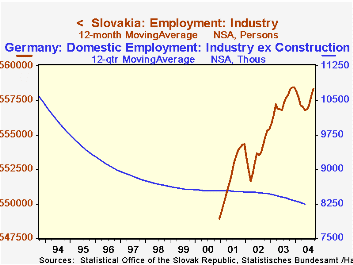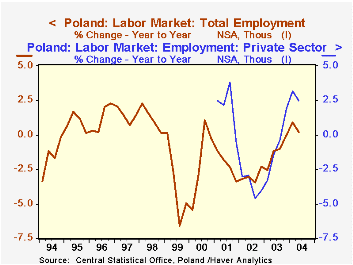 Global| Nov 10 2004
Global| Nov 10 2004Slovakia Employment Firms in September; Former Soviet-Bloc Nations Show Irregular Progress 15 Years Later
Summary
Last night was the 15th anniversary of the fall of the Berlin Wall. Yesterday's (November 9) Wall Street Journal included a major article arguing that the resulting reunification of Germany had not brought the anticipated surge of [...]

Last night was the 15th anniversary of the fall of the Berlin Wall. Yesterday's (November 9) Wall Street Journal included a major article arguing that the resulting reunification of Germany had not brought the anticipated surge of economic benefits to that nation, but that other Central and Eastern European countries had done better.
Some recent measures of economic activity tend to bear this out, although the evidence is not clear. Most simply, data histories are short for many of these nations, rendering exact comparisons virtually impossible. Tomorrow, November 11, Germany will report its 3rd quarter GDP and the "newer" nations will come some weeks from now. Through the second quarter, it was certainly the case that over recent years, these other countries -- the Czech Republic, Poland, Hungary, and so on -- have had faster growth rates than Germany; we can comment more tomorrow on this development.
Today, though, we have employment data through September for Slovakia, so we can make some limited comparisons about job growth. Data for "industry", which includes manufacturing, mining and utilities, extend back to 2000. For some other categories of business, they begin in 2001. Over the last year, "industry" jobs have grown at about a 1-1/4% pace. Total "registered employment", encompassing "industry" and private services, is expanding at about 1-1/2%. In Germany, jobs in the "total economy" are increasing, but only at about 0.2% in the second and third quarters over respective year-ago periods. Jobs in Germany's industrial sector, "Industry excluding Construction", have been declining noticeably, through the 2nd quarter by 2.2% from a year ago.
These partial data indicate that Slovakia has a more vigorous economy at present than Germany. But this is not the whole story. As seen in the table below, there was a notable slump in total jobs in Slovakia during 2002 and 2003 which was more severe than in Germany.  A similar pattern is evident in neighboring Poland, a country held up in the Wall Street Journal as the more vigorous counter-example to Germany's unexpected post-Unification slowness. Through the second quarter, total employment in Poland is barely increasing from year-earlier levels; however, private sector jobs have been advancing at about a 2.5% pace. This is quite favorable, but it also follows a deep decline in the private sector during 2002 and most of 2003.
A similar pattern is evident in neighboring Poland, a country held up in the Wall Street Journal as the more vigorous counter-example to Germany's unexpected post-Unification slowness. Through the second quarter, total employment in Poland is barely increasing from year-earlier levels; however, private sector jobs have been advancing at about a 2.5% pace. This is quite favorable, but it also follows a deep decline in the private sector during 2002 and most of 2003.
These jobs data suggest that economic progress in the recently freed Soviet bloc is occurring, but in fits and starts. Such swings are hardly surprising as those nations work to restructure their economic systems and their incentive structures. No one said this would be easy.
| Millions | Sept 2004 | 2nd Qtr 2004 | Year/Year | 2003 | 2002 | 2001 |
|---|---|---|---|---|---|---|
| Slovakia: Total | 1.248 | 1.5 | -4.3 | -1.3 | NA | |
| "Industry" | 0.571 | 1.1 | 0.5 | 0.2 | 1.0 | |
| Poland: Total | 13.682 | 0.2 | -1.2 | -3.0 | -2.2 | |
| Private Sector | 9.458 | 2.4 | -0.8 | -3.7 | 2.0 | |
| Germany: Total | 38.543* | 38.338 | 0.3* | -1.0 | -0.6 | 0.4 |
| "Industry ex Construction" | 7.953 | -2.2 | -2.7 | -2.2 | 0.1 |
Carol Stone, CBE
AuthorMore in Author Profile »Carol Stone, CBE came to Haver Analytics in 2003 following more than 35 years as a financial market economist at major Wall Street financial institutions, most especially Merrill Lynch and Nomura Securities. She had broad experience in analysis and forecasting of flow-of-funds accounts, the federal budget and Federal Reserve operations. At Nomura Securities, among other duties, she developed various indicator forecasting tools and edited a daily global publication produced in London and New York for readers in Tokyo. At Haver Analytics, Carol was a member of the Research Department, aiding database managers with research and documentation efforts, as well as posting commentary on select economic reports. In addition, she conducted Ways-of-the-World, a blog on economic issues for an Episcopal-Church-affiliated website, The Geranium Farm. During her career, Carol served as an officer of the Money Marketeers and the Downtown Economists Club. She had a PhD from NYU's Stern School of Business. She lived in Brooklyn, New York, and had a weekend home on Long Island.
More Economy in Brief
 Global| Feb 05 2026
Global| Feb 05 2026Charts of the Week: Balanced Policy, Resilient Data and AI Narratives
by:Andrew Cates





